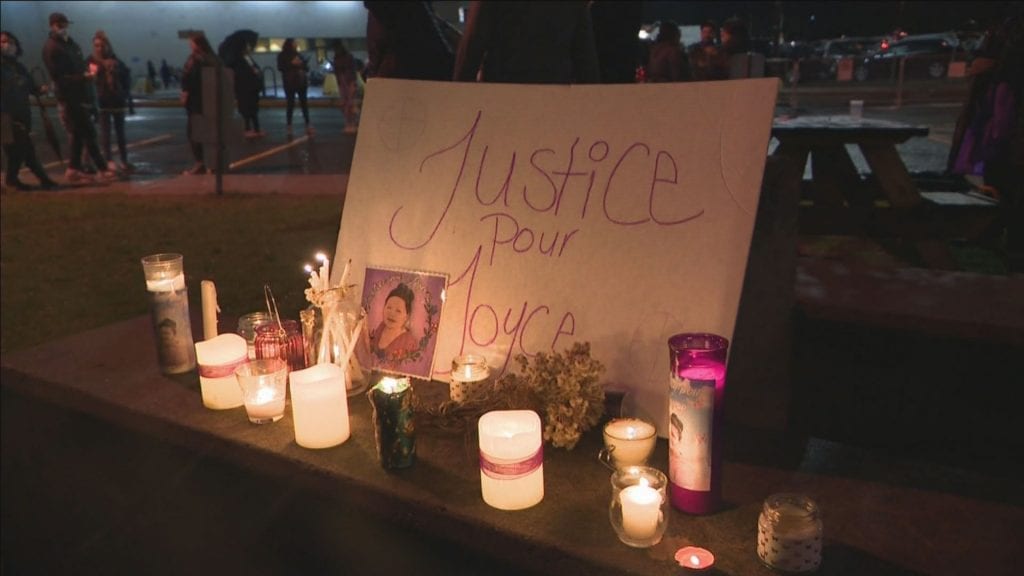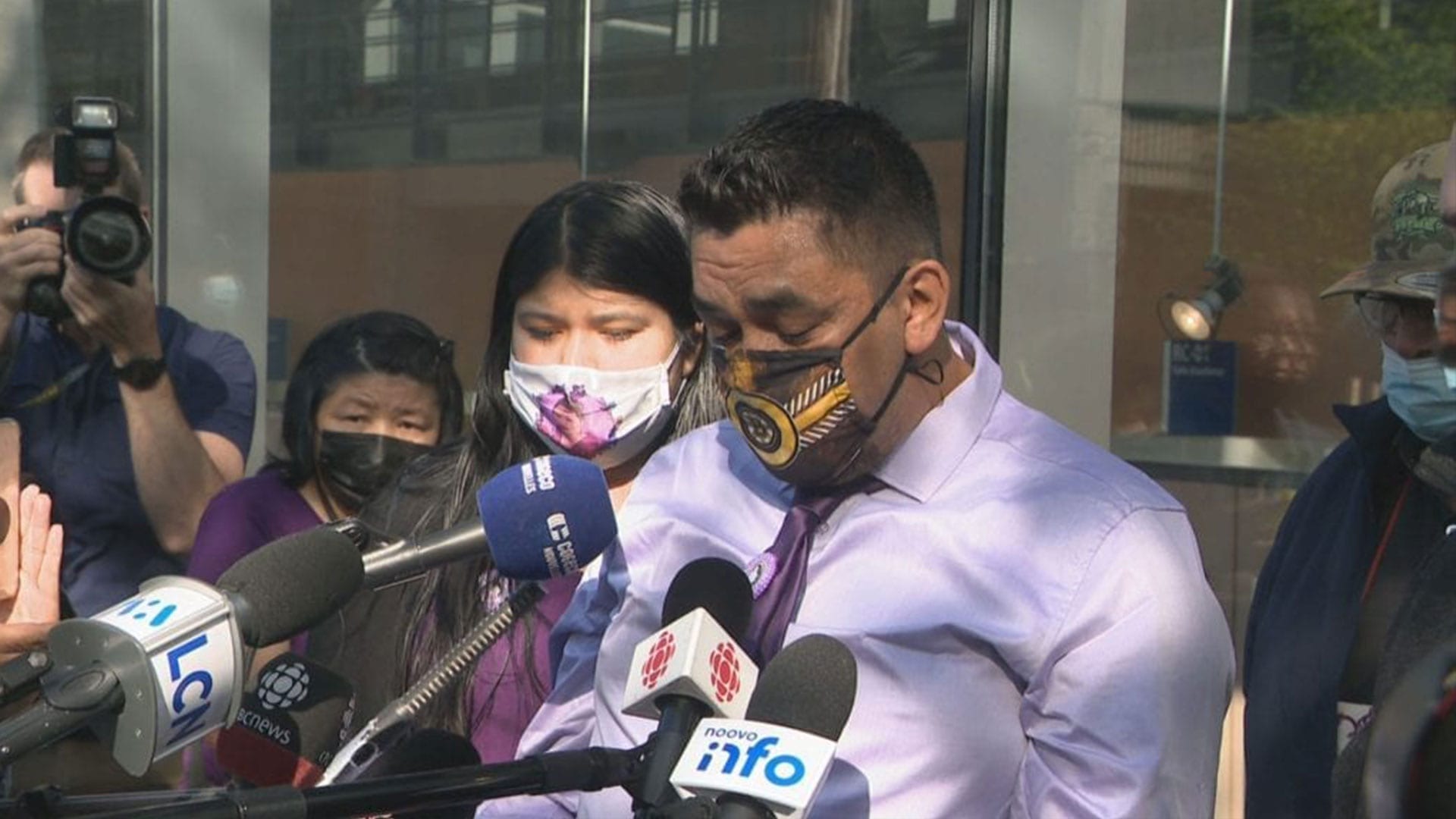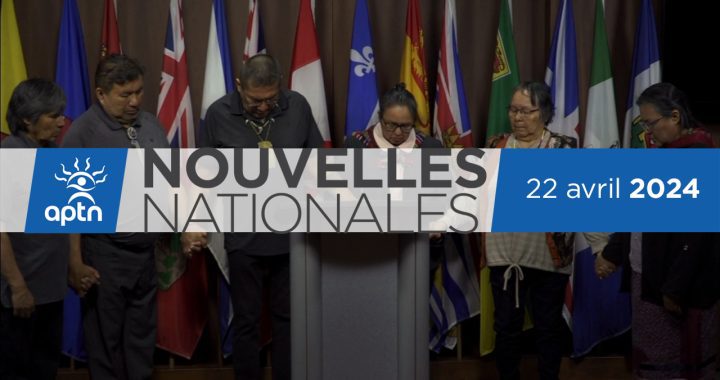
While a former Quebec orderly who was caught on video making derogatory comments about an Atikamekw woman insisted she was trying to motivate Joyce Echaquan, a 37 year old mother of seven, the coroner who is overseeing the inquest into her death dismissed the explanation.
The orderly, one of two hospital employees fired following the death of Echaquan last September, was filmed on a Facebook Live video asking the patient what her kids would think of her and saying she had made bad life choices.
“In all my comments, I was trying to be benevolent,” the orderly, whose name is protected by a publication ban, told the inquiry Wednesday. She insisted there was no malice in her words and that she was advised against apologizing formally to Echaquan’s family.
Coroner Gehane Kamel responded that those comments were anything but well-meaning and were full of judgment.
The inquest is investigating the death of Echaquan who broadcast herself in a Facebook Live video at the hospital in Joliette, Que., northeast of Montreal, as two female staff – an orderly and a nurse – were heard insulting and mocking her not long before she died on Sept. 28, 2020.
Kamel ordered the seven-minute video shot by Echaquan to be played in the courtroom for the first time.
The orderly defended herself, saying her comments reflected a technique frequently used with a person in crisis to get them to focus on something, in this case, Echaquan’s kids.

Earlier Wednesday, a nurse in training who was assigned to care for Echaquan the morning of her death told the inquiry the patient fell twice from her hospital bed and was restrained to keep her from harming herself.
The young nurse said Echaquan had asked to be discharged. But while she was preparing the paperwork, the nurse said Echaquan’s condition worsened. The nurse said she was watching the patient from outside the observation room despite hospital policy stating that someone under restraint had to be monitored closely.
She said once it became clear that Echaquan’s vital signs had worsened, she tried in vain to get her in the reanimation room but said she was told the room would take 10 minutes to clean.
The nurse in training was paired with a veteran nurse who was caught insulting Echaquan in the Facebook video – but the young woman ended up alone because the older nurse had to attend to other patients.
The young nurse said better support is needed for nurses in training. She said she had never cared for a patient who was in restraints, adding that she felt as though she was going to be blamed for what happened to Echaquan.
“My clients want to tell you that they don’t blame you at all,” Patrick Martin-Menard, the Echaquan family lawyer, told the young nurse.
A different hospital orderly was present the day Echaquan died and told the inquest the patient’s condition changed rapidly that morning. Echaquan was calm around breakfast before allegedly yelling and repeatedly hitting her head against a wall by mid-morning, she said.
She said Echaquan was given a sedative and transferred to a private room.
“You could see in her eyes, they were empty, she wasn’t there,” the orderly said.
She attended to other patients and around 11 a.m., she returned to find Echaquan restrained by all four limbs to the hospital bed. The orderly said she was asked to get a fifth restraint to secure Echaquan’s abdomen.
A restrained patient, she said, is supposed to be under constant surveillance but Echaquan was left alone.
“There was no one with her,” the orderly testified.
The orderly said after Echaquan was restrained, the nurse, in a state of panic, told her she had been filmed and had deleted the video. She said the colleague told her: “She filmed everything,” referring to Echaquan, before adding, “I deleted it.”
The orderly said she told her supervisor about the nurse deleting the video.
To this day, the orderly said she doesn’t know how Echaquan died. The cause of death has not been made public.
The orderly said since Echaquan’s death, there has been fear between the Indigenous Atikamekw community and hospital staff. “They are afraid of us and we are afraid of them.”
She said it’s sad it took a death for something to change, adding that she believes hiring more Atikamekw staff at the hospital would be helpful.
“What I want to understand is why they’re afraid ? Why are they afraid of me? Why are they afraid to get care?” the orderly asked.
“It’s been a long time that we’ve been hearing this, it’s about time we deal with it.”
Quebec nurse admits prejudice about Indigenous patients among staff

In earlier testimony, a nurse who works at the Joliette hospital told the inquest Tuesday there is a perception among her colleagues that Indigenous people are alcoholics or drug addicts.
The nurse, whose identity is protected by a publication ban, initially told the inquiry she had never heard any negative comments by staff toward Indigenous patients. But she revised her testimony after pointed questioning from Kamel, admitting there were issues between the Atikamekw community and workers at the hospital in Joliette, Que.
“In my opinion, I think there is a problem with the Joliette hospital with the (Atikamekw) community,” the nurse said, agreeing with the coroner there was a perception among her colleagues that those patients have problems with alcohol and drugs. “We hear a lot of comments like that,” she said.
Kamel said she welcomed the honesty from the witness, one of four nurses and an orderly testifying on Day 4 of the public hearings in Trois-Rivieres, Que.
From the onset of the inquiry, Kamel has said the behaviour and attitude of hospital staff toward Echaquan are integral to understanding the circumstances of her death.
“Maybe you are the first step toward this reconciliation,” Kamel said. “I hope that those who follow you (to the stand) will be able to sit before me and tell me this.”
But the nurse stood out from other witnesses, who largely maintained they were unaware of rudeness, derogatory comments or prejudicial views towards Indigenous or non-white patients, although some added the proviso that they couldn’t say it never happened.
On Monday, Kamel had urged honesty from participants after hospital staff testified they weren’t aware of derogatory comments toward Indigenous patients or other minorities.
The coroner has said repeatedly she finds it hard to believe everything was perfect at the hospital. Members of the Atikamekw community from Manawan, Que., have said they’re fearful of seeking treatment at the hospital, and since Echaquan’s death, staff have been required to watch a three-hour video about the community’s history and culture.
Staff have testified that training did little to address day-to-day interactions with Indigenous patients.
The first nurse to testify Tuesday said that on the evening before her death, Echaquan had asked to be restrained to the hospital bed while in an agitated state.
Echaquan’s relatives have testified they were shocked to find her body in restraints after she died. Family members have told the inquiry that Echaquan told them she didn’t like to be restrained at the hospital.
Dr. Jacques Ramsay, who is assisting Kamel, told the inquiry he had never heard of a patient asking to be restrained.










